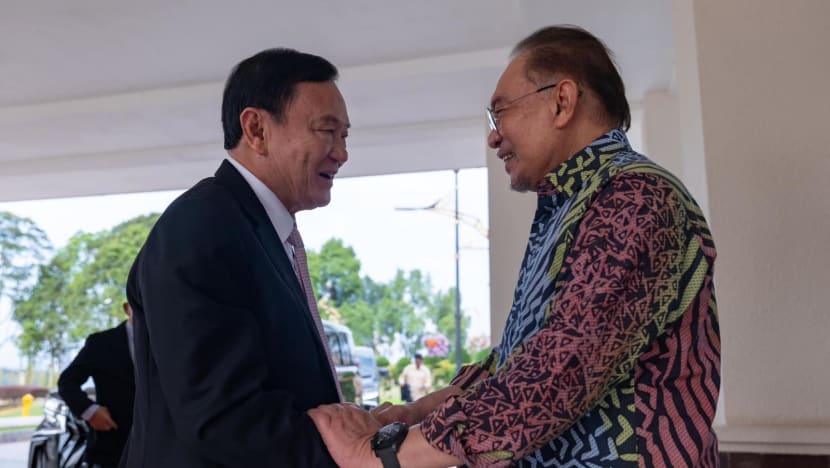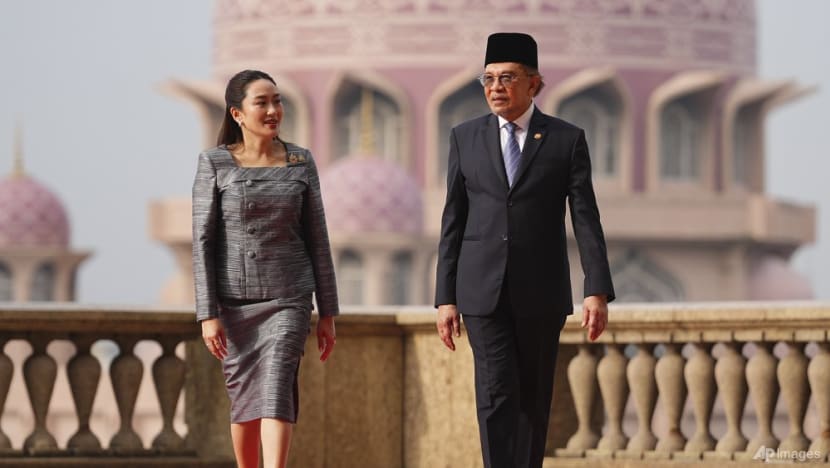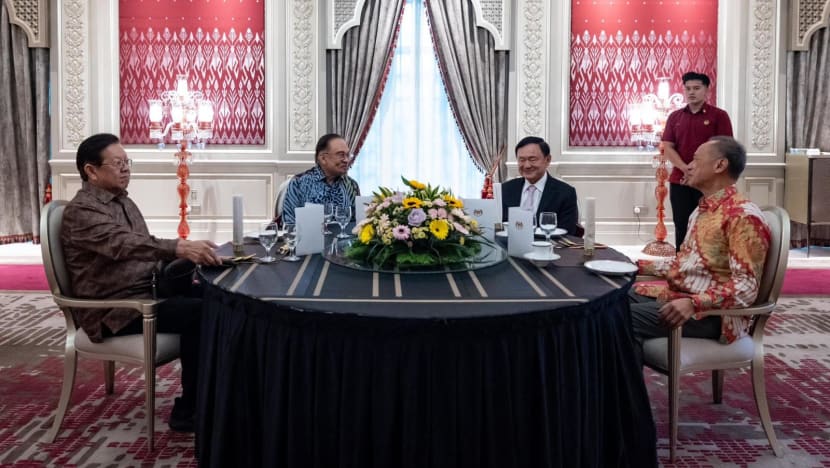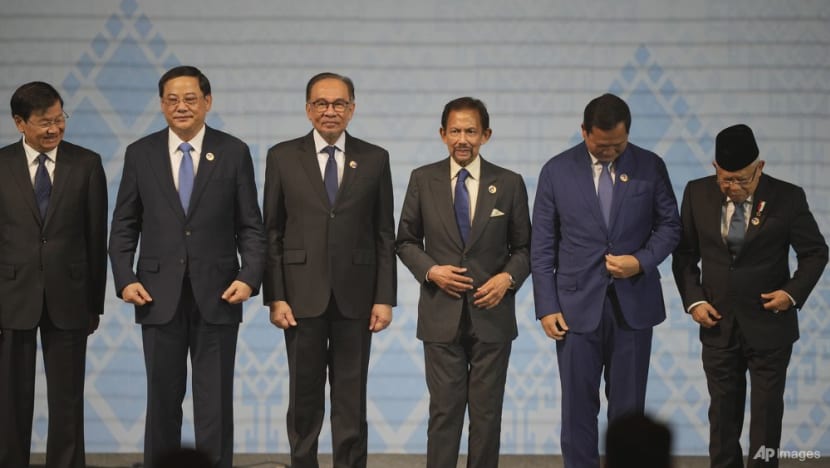analysis Asia
‘Diplomatic flexibility’: Malaysia’s coyness over its ASEAN advisers could help region but hurt PM Anwar
Malaysia could be adopting strategic ambiguity over its informal ASEAN advisers so they could negotiate sensitive situations more freely, some observers argue. But PM Anwar risks sidelining his own team, others say.

Malaysia Prime Minister Anwar Ibrahim (right) meeting former Thai premier Thaksin Shinawatra, who is also informal adviser to the ASEAN chair, in Malaysia on Feb 2, 2025. (Photo: Facebook/Anwar Ibrahim)

This audio is generated by an AI tool.
KUALA LUMPUR: Details on who exactly are in an informal advisory group to Malaysia’s chairmanship of the Association of Southeast Asian Nations (ASEAN) have come in dribs and drabs since Prime Minister Anwar Ibrahim first revealed almost two months ago that former Thai premier Thaksin Shinawatra would lead this team.
Analysts told CNA that Malaysia could be choosing to remain ambiguous on such details to allow Anwar to consult these advisers freely without ASEAN’s red tape, and also because the advisers are outside the government’s purview.
The latest possible additions to the group include a senior statesman from Laos as well as Brunei’s Sultan Hassanal Bolkiah, according to Malaysia’s Foreign Minister Mohamad Hasan’s comments in parliament on Thursday (Feb 6).
The lack of official statements on the advisory team “is designed to ensure that the grouping remains informal and allows Anwar to seek advice without the bureaucratic constraints of ASEAN”, said Asrul Hadi Abdullah Sani, a partner at strategic advisory firm ADA Southeast Asia.
Sharon Seah, senior fellow and coordinator at the ISEAS-Yusof Ishak Institute’s ASEAN Studies Centre, added: “It is not in Malaysia’s Prime Minister’s Office (PMO) or the Ministry of Foreign Affairs’ place to issue an official statement since the appointments of PM Anwar’s advisers are informal and outside the framework of the government establishment.”
Other analysts said this ambiguity allows Anwar to appoint such figures to his team without having to get the consent of their countries’ governments. It also allows Malaysia to adopt a “wait-and-see” approach to how other ASEAN member states might react to Anwar’s move.
Not officially announcing who is on the team will also free its members from making what could be seen as “official” promises in negotiations on sensitive issues, such as during backdoor discussions with various parties in Myanmar on resolving the conflict there, they said.
While such vagueness could have its benefits, observers told CNA that Anwar’s approach risks “alienating” regional governments and “sidelining” his own officials, noting that such diplomatic expertise already exists in his own government.
ASEAN’s 10 members are Brunei, Cambodia, Indonesia, Laos, Malaysia, Myanmar, the Philippines, Singapore, Thailand and Vietnam.
During an official visit to Putrajaya by Thai Prime Minister Paetongtarn Shinawatra last December, Anwar named her father and former premier Thaksin to lead a team of unofficial advisers to Malaysia’s chairmanship of ASEAN.
This team could also include former Singapore foreign minister George Yeo, Anwar said then, adding that he needed the “benefit of the experience of such statesmen”.
Subsequent media reports surfaced former Indonesia foreign minister Retno Marsudi and former Cambodia prime minister Hun Sen as possible members of the team.
Analysts previously told CNA that these influential political figures could help the ASEAN chair tackle complex issues such as the Myanmar conflict and tensions in the South China Sea, without the baggage of holding official positions in ASEAN or their respective governments.
For instance, Thaksin’s appointment could be linked to his familiarity with Myanmar’s political landscape as well as his connections in the country.

Malaysia’s Foreign Affairs Ministry and Prime Minister’s Office have not officially confirmed the members of this informal team. CNA’s queries to these entities remain unanswered.
On Feb 2, Anwar posted on Facebook that he had met Thaksin and Yeo over dinner to discuss the situation in Myanmar as well as developments in cryptocurrency, among other “key matters” in the region.
Also pictured at the dinner was Malaysia’s Institute of Strategic and International Studies (ISIS) chairman Mohd Faiz Abdullah, although he was not identified by name in Anwar’s post. A representative from the think tank could not respond to CNA’s queries on Mohd Faiz’s involvement at the meeting and the issues that were discussed.
On Thursday, in response to a question on whether Malaysia would use Thaksin’s influence to help resolve conflicts in Myanmar and southern Thailand, Foreign Minister Mohamad Hasan stressed that Thaksin is an adviser to Anwar and not ASEAN.
“It’s not just Thaksin; he’s just one of them. The chair (of ASEAN) will also appoint others from other countries as advisers,” Mohamad said.
“(This includes) senior elder statesmen from Singapore, Laos and others. The Sultan of Brunei has also given the green light - he is the longest-serving ASEAN leader, and he is open to giving advice anytime.”
But an academic’s criticism of the early stages of Malaysia’s ASEAN chairmanship has thrust Anwar’s moves into the spotlight, sparking dismissals on Wednesday from ruling coalition lawmakers.
IS THAKSIN THE RIGHT MAN?
In a commentary titled “Malaysia’s ASEAN chairmanship is off to a disappointing start” first published on Benar News on Jan 29, Bridget Welsh, an honorary research fellow at the University of Nottingham Malaysia's Asia Research Institute, argued that “Malaysia’s chairmanship risks the potential of being too much about Anwar, and not enough about ASEAN”.
“For example, Anwar’s personal choice of ally and former Thai Prime Minister Thaksin Shinawatra as an ASEAN adviser did not go down well in a politically divided Thailand. Nor did it recognise that Thaksin’s interventions around the Myanmar crisis have not helped,” she wrote.
The commentary was picked up by several other news outlets before triggering spirited rebuttals from three members of parliament belonging to the Pakatan Harapan coalition led by Anwar.
Thaksin’s appointment was a strategic move given his extensive experience in regional politics and economic diplomacy, Bakri MP Tan Hong Pin shot back. Petaling Jaya MP Lee Chean Chung said Anwar was making an “astute” decision to engage someone with credentials in dealing with issues in Indochina and Myanmar.
“I wonder who this foreign academic Bridget Welsh is to keep slamming the Madani government and Prime Minister Datuk Seri Anwar Ibrahim,” said Jelutong MP RSN Rayer in a statement.
“(Thaksin) is a man who has been a force in the region for three decades and whose daughter is currently the Thai prime minister. Of course he will have some influence, some economic clout and good ideas to boost regional cooperation.”
Welsh told CNA that engaging informal advisers to the ASEAN chair is only a “marginally positive” step in addressing the Myanmar crisis, stressing that it is “vital” to engage local stakeholders inclusively.
“The informal advisers can alienate stakeholders, as Thaksin does for example for many ethnic armed groups in Myanmar,” she said.
“Anwar is seemingly creating a new 'boys club' of advisers … This risks alienating regional governments - moving ASEAN to the PM office rather than the foreign ministry or secretariat. A more formal inclusive expert committee on Myanmar, not just politicians, might be more productive.”
A former Malaysian diplomat who served in at least three different continents said Anwar’s move to rely on foreign advisers is unsurprising as he seeks to “make his mark” as ASEAN chair.
“His preferred style is to depend upon a few close advisers of his own choosing instead of falling back on his own cabinet and the establishment,” said the former diplomat, speaking on the condition of anonymity.
The former diplomat said it is not helpful, however, for Anwar to be “sidelining his own team” as he will need the support of key government agencies to succeed as ASEAN chair.
“It’s also an opportunity for Malaysia to make its mark; the involvement of foreign advisers seems a distraction. It is unclear what value these foreign advisers can bring to the table that isn’t already there in our own establishment,” the former diplomat added.
“DIPLOMATIC FLEXIBILITY”
James Chin, an Asian studies professor at the University of Tasmania, told CNA that Thaksin has “close links” with the Myanmar junta and - unlike younger ASEAN leaders or officials - is thus able to easily engage the leadership there.
“Thaksin doesn't officially hold a political post, so (the junta is) more likely to speak to him. Maybe they are more forthcoming with him about how they want to settle the Myanmar issue,” he said.
Chin believes Malaysia might be keeping relatively silent on the full membership of the advisory team to ensure these people can engage parties in Myanmar with more candour, calling it diplomatic flexibility.
“The reason why the Malaysia government can’t make it official is that if the (advisers) meet Burmese leadership, the leadership will take whatever promises made as official promises,” he said.
“By using this unofficial nature, the advisers can discuss options and know that if they don’t deliver, it's okay.”

Another possible reason for the ambiguity is to allow Anwar to engage figures from different countries without needing to get official permission from their governments, Chin said.
While Anwar mentioned he had gotten Paetongtarn’s blessing to appoint Thaksin, he did not say the same for Yeo and the Singapore government. Yeo has referred CNA’s queries on his involvement in the advisory team to Malaysia’s PMO.
“The moment you make them official, you need the agreement of all the ASEAN states,” Chin said.
“You don’t want to complicate things; you just say ‘these are my unofficial advisers’, they go abroad and they know all these people in Myanmar and China. Let them talk, see what jumps up. (There is) no harm.”
WHO ELSE MIGHT BE IN AND WHY?
Azmi Hassan, a senior fellow at the Nusantara Academy for Strategic Research, agreed that Malaysia’s PMO has said “nothing much” about the advisory team, and that any public information only came in “bits and pieces” from Anwar.
“On the (recent) discussions with Thaksin, I know Myanmar was the particular issue, but with George Yeo, we have no idea yet. Whether Hun Sen or Retno will be roped in, we have no idea yet,” he said.
“I think it's just a wait-and-see attitude from Anwar and also the PMO to see the reaction from other ASEAN members regarding this particular strategy of an unofficial special adviser to the chairman of ASEAN.”
On the revelation that Laos and Brunei could also be involved, Azmi said Anwar might be trying to appoint advisers from all nine other ASEAN member states out of courtesy and respect, in line with the Southeast Asian tradition of “saving face”.
Azmi said that Brunei’s Sultan Hassanal Bolkiah could also have agreed to share informal advice with Anwar - despite being a head of state - due to their “cordial relationship”.
“So I think there’s nothing odd about it, if you look from that particular angle,” he added.
“But as I see it, Thaksin is there, Hun Sen most probably will be there, George Yeo from Singapore is also there. And now Laos and the Sultan of Brunei. No surprise if Datuk Seri Anwar wants to seek advice from an additional four appropriate leaders.”

Jamil Ghani, a doctoral candidate at the S Rajaratnam School of International Studies who has done research on Malaysian foreign policy, said approaching the Brunei sultan as an unofficial adviser could be seen as “unconventional”.
“Typically, advisory roles are filled by individuals who are not currently holding official positions, allowing them to provide counsel without the constraints associated with active governance roles,” he told CNA.
“Sultan Hassanal Bolkiah is generally seen as a neutral figure in regional affairs. This move might be aimed at leveraging his stature to address complex regional issues, such as the South China Sea disputes.”
ADA Southeast Asia’s Asrul Hadi said it is understandable Anwar would want to rely on diplomatic heavyweights to help navigate ASEAN, with the Myanmar issue appearing to be at the “core” of these efforts.
The analyst noted that Yeo was introduced to Anwar by the late former Malaysia finance minister Daim Zainuddin in 1990, and that Anwar and Yeo have maintained their relationship since, with the latter having “valuable experience” from several advisory roles in the corporate sector.
Hun Sen and Retno also have experience dealing with the different factions and generals in Myanmar, Asrul Hadi said.
“Both Hun Sen, the (former) chair of ASEAN, and Retno, ASEAN's special envoy to Myanmar (when Indonesia was ASEAN chair in 2023), have previously attempted to find a resolution,” he added.
Rather than appointing an individual as special envoy to Myanmar, like the previous two chairs, Indonesia had established a special envoy’s office headed by Retno, working alongside longtime diplomat Ngurah Swajaya.
Another question revolves around the ISIS think tank chairman Mohd Faiz’s involvement in the team. His official ISIS biography states that he is also Malaysia’s representative to the ASEAN Regional Forum Experts and Eminent Persons meeting.
The meeting is a forum for open discussion and recommendations on regional security issues. Based on their expertise, members provide recommendations that can guide ASEAN governments in their actions.
ISEAS’ Seah explained that ISIS is leading Malaysia’s efforts in engaging with various ASEAN Track 2 entities. ASEAN Track 2 refers to a non-governmental, informal and unofficial approach to conflict resolution and regional cooperation in Southeast Asia.
“Possibly, PM Anwar could be using Prof Mohd Faiz Abdullah to play a bridging role between his informal advisory group, the Track 2 community and with (the foreign ministry) Wisma Putra,” Seah added.




















